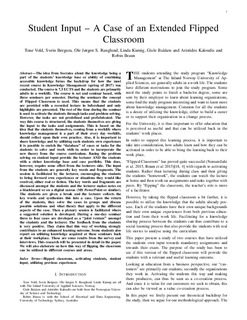| dc.contributor.author | Vold, Aud Tone | |
| dc.contributor.author | Bergum, Svein | |
| dc.contributor.author | Ranglund, Ole Jørgen Stefferud | |
| dc.contributor.author | Kiønig, Linda Vibeke | |
| dc.contributor.author | Bakken, Gisle | |
| dc.contributor.author | Kaloudis, Aris | |
| dc.contributor.author | Braun, Robin | |
| dc.date.accessioned | 2018-04-19T09:21:43Z | |
| dc.date.available | 2018-04-19T09:21:43Z | |
| dc.date.created | 2017-10-05T17:26:54Z | |
| dc.date.issued | 2017 | |
| dc.identifier.isbn | 978-1-5386-3968-9 | |
| dc.identifier.uri | http://hdl.handle.net/11250/2494972 | |
| dc.description.abstract | The idea from Socrates about the knowledge being a part of the students' knowledge base or ability of combining accessible knowledge forms the backdrop for how the most recent course in Knowledge Management (spring of 2017) was conducted. The course is 7,5 ECTS and the students are primarily adults in a worklife. The course is net and seminar based, with three seminars per semester. During the seminars the concept of Flipped Classroom is used. This means that the students are provided with a recorded lecture in beforehand and only highlights are presented. The rest of the time during the seminar is used to activate the students through tasks and problem solving. However, the tasks are not predefined and prefabricated. The way this course is structured, the students themselves are giving the input to the tasks and assignments. This is based on the idea that the students themselves, coming from a worklife where knowledge management is a part of their every day worklife, should reflect upon their own practice. Also, it is important to share knowledge and by utilizing each students own experiences it is possible to enrich the “database” of cases or tasks for the students to solve and work with in order to incorporate the new theory from the course curriculum. Basing the problem solving on student input provide the lecturer AND the students with a richer knowledge base and case portfolio. This does, however, require some effort from the lecturers side. The input from the students are generally key words and fragments. The session is facilitated by the lecturer, encouraging the students to bring forward own experiences or situations they would like resolved, either real or fiction. The key words and fragments are discussed amongst the students and the lecturer makes notes on a blackboard or on a digital canvas (MS PowerPoint or similar). The students are given a break and the lecturer collects the key words and synthesizes this into a case. Upon the return of the students, they solve the cases in groups and discuss possible solutions and what theory that apply to the different aspects of the case. Then a plenary session is facilitated where a suggested solution is developed. During a one-day seminar three to four cases are developed as a “joint venture” amongst the students and the lecturer. The feedback from the students is very positive. They claim that this way of working strongly contributes to an enhanced learning outcome. Some students also report on utilizing knowledge acquired at these seminars back at their workplace. These are some results from the survey and interviews. This research will be presented in detail in the paper. We will also elaborate on how this way of flipping the classroom can be utilized in different courses and areas. | nb_NO |
| dc.language.iso | eng | nb_NO |
| dc.publisher | Institute of Electrical and Electronics Engineers (IEEE) | nb_NO |
| dc.relation.ispartof | 2017 16th International Conference on Information Technology Based Higher Education and Training (ITHET) | |
| dc.title | Student Input – A Case of an Extended Flipped Classroom | nb_NO |
| dc.type | Chapter | nb_NO |
| dc.description.version | acceptedVersion | nb_NO |
| dc.identifier.doi | 10.1109/ITHET.2017.8067801 | |
| dc.identifier.cristin | 1502673 | |
| dc.description.localcode | © 2017 IEEE. Personal use of this material is permitted. Permission from IEEE must be obtained for all other uses, in any current or future media, including reprinting/republishing this material for advertising or promotional purposes, creating new collective works, for resale or redistribution to servers or lists, or reuse of any copyrighted component of this work in other works. | nb_NO |
| cristin.unitcode | 194,60,25,0 | |
| cristin.unitname | Institutt for industriell økonomi og teknologiledelse | |
| cristin.ispublished | true | |
| cristin.fulltext | original | |
| cristin.qualitycode | 1 | |
